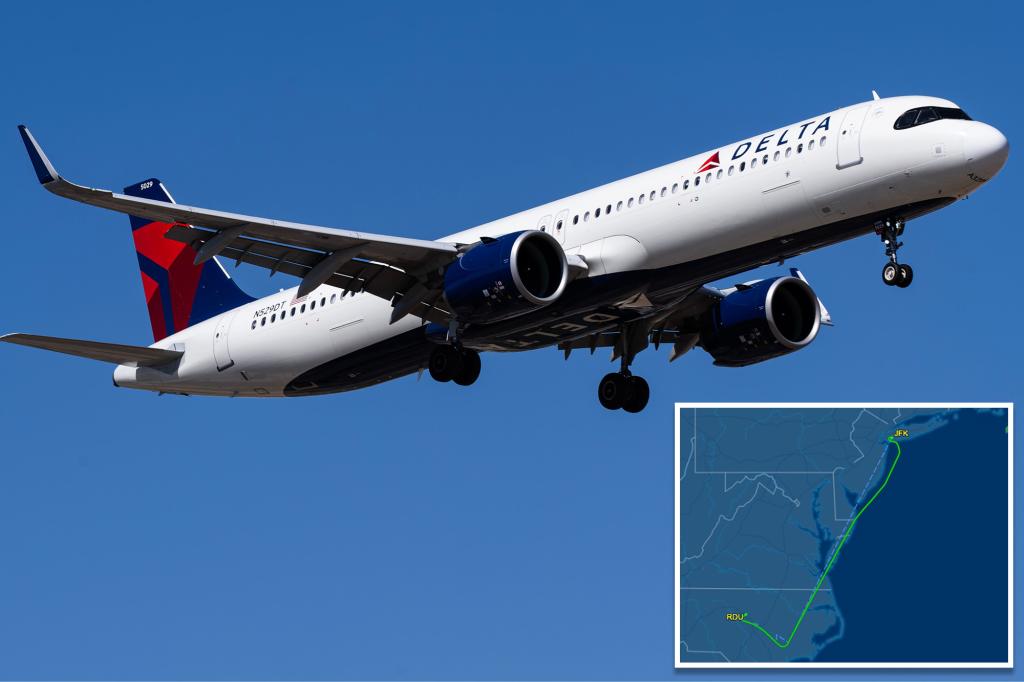Incident Overview: Delta Flight 2090 Diverted Due to Cabin Odor
On Saturday, February 1st, Delta Air Lines Flight 2090, an Airbus A321 en route from John F. Kennedy International Airport (JFK) in New York City to Orlando International Airport (MCO) in Florida, experienced an unexpected disruption. The flight, carrying 158 passengers, was diverted to Raleigh-Durham International Airport (RDU) in North Carolina after an unusual odor was detected within the cabin. The diversion occurred mid-flight, interrupting the scheduled arrival in Orlando at 2:30 p.m. Delta Air Lines officials confirmed the incident, emphasizing the safe landing of the aircraft in Raleigh and apologizing to passengers for the resulting travel delay.
Delta’s Response and Passenger Accommodation
Following the unscheduled landing in Raleigh, Delta Air Lines took steps to minimize the disruption to their passengers’ travel plans. The airline arranged for the affected passengers to continue their journey to Orlando. This involved providing alternative transportation options, including rebooking passengers on earlier flights to their final destination or arranging for a new aircraft to transport the entire group. Ultimately, a replacement plane was secured, and the passengers arrived in Orlando just before 9:00 p.m., approximately six and a half hours after their originally scheduled arrival time. Delta’s spokesperson reiterated the airline’s commitment to passenger safety and apologized for the inconvenience caused by the unforeseen event.
The Mysterious Odor and Lack of Immediate Explanation
The precise cause of the odor that prompted the flight’s diversion remained unknown immediately following the incident. No official explanation was offered by Delta Air Lines, and investigations were presumably underway to determine the source of the smell. The nature of the odor, whether it posed any potential safety risk, and the specific location within the cabin where it was first detected were not disclosed. This lack of information naturally led to speculation and underscored the importance of a thorough investigation to address passenger concerns and prevent similar incidents in the future.
Parallel Incident: United Airlines Flight Experiences Engine Fire
Coincidentally, another airline incident occurred over the same weekend, highlighting the inherent risks associated with air travel. A United Airlines flight, Flight 1382, traveling from Houston to New York, experienced an engine fire during takeoff. The incident, which took place at George Bush Intercontinental/Houston Airport, prompted an emergency evacuation of the aircraft. Passengers and crew were deplaned onto the runway using a combination of slides and stairs and were subsequently transported to the terminal by bus. Fortunately, no injuries were reported, and the passengers were later placed on another aircraft to continue their journey to New York.
Investigation and Regulatory Oversight
The Federal Aviation Administration (FAA) confirmed that they are investigating both the Delta Air Lines and the United Airlines incidents. The FAA’s investigations will likely involve a comprehensive review of the circumstances surrounding each event, including maintenance records, pilot actions, and any other relevant factors. The goal of these investigations is to determine the root causes of the incidents, implement necessary corrective actions, and enhance aviation safety protocols. The outcomes of these investigations will be crucial in preventing similar incidents and ensuring the continued safety and reliability of air travel.
Emphasis on Passenger Safety and Airline Response
Both incidents underscore the paramount importance of passenger safety in air travel. The swift actions taken by the flight crews and ground personnel in both cases – diverting the Delta flight and evacuating the United Airlines flight – demonstrate the commitment to prioritizing passenger well-being in emergency situations. The airlines’ subsequent efforts to accommodate the affected passengers and provide alternative travel arrangements highlight the importance of effective communication and customer service in mitigating the impact of such disruptions. These incidents serve as reminders of the complex and dynamic nature of air travel and the ongoing need for vigilance and continuous improvement in safety procedures.

